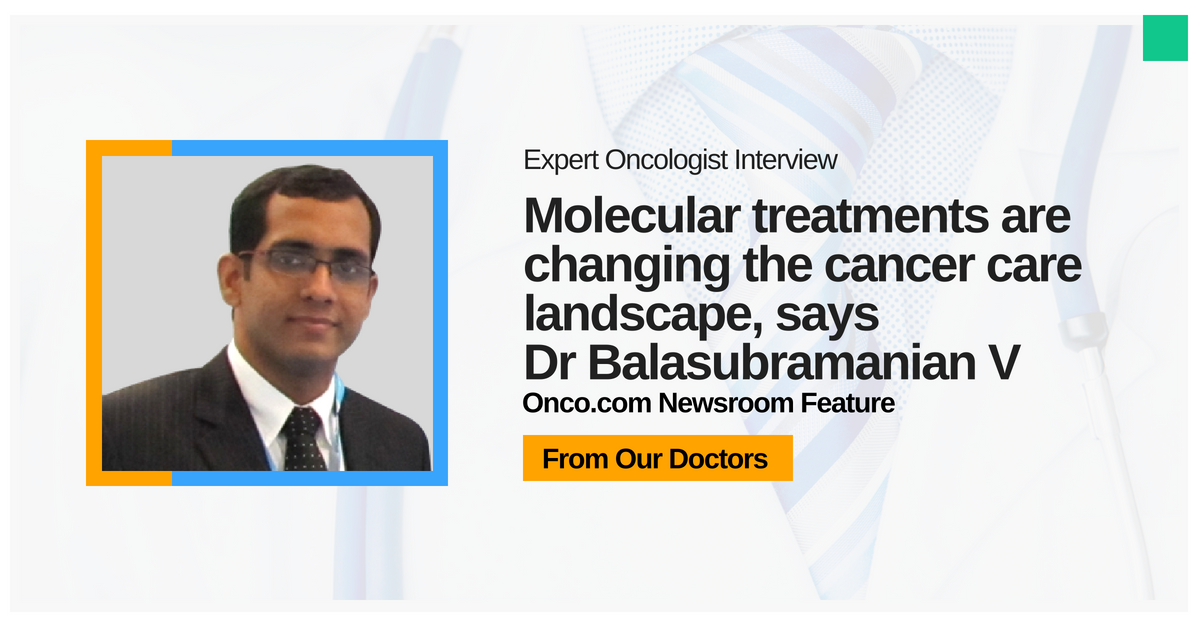Meet Dr Balasubramanian V
Dr Balasubramanian V is an expert in breast oncology (with reconstruction), thoracic malignancies, gastro-intestinal malignancies (especially those that require minimally invasive surgical treatments), gynecological malignancies and cancers of the head & neck region.
 Academic & Professional Achievements
Academic & Professional Achievements
After finishing high-school as a school topper under the CBSE regime, Dr Balasubramanian graduated in medicine from Coimbatore. He developed a keen interest in medical research during his graduation days, and joined AIIMS New Delhi for his post-graduation, with an all-India rank (AIR) of 18 in the entrance test. He maintains that the time spent at AIIMS armed him with a different outlook on practicing medicine. During his second year at AIIMS, he finished his first podium presentation and his first international publication. He has authored a number of international publications during his tenure at AIIMS.
He was a part of the thoracic and minimally invasive surgery department during his post-grad days, and he gained significant exposure in the treatment of gastro-intestinal malignancies. Before moving to Chennai to join his specialty training, Dr Balasubramanian served as a senior resident at the AIIMS cancer specialty center.
Once he was in Chennai, Dr Balasubramanian finished training as an MCh in surgical oncology from Cancer Institute (WIA), the oldest cancer institute in India. At this time, he received training in a variety of surgical procedures and became involved in multiple research projects. He received an award as the best outgoing surgeon at the completion of his training. Since then, he has served as a consultant surgical oncologist across many premier cancer hospitals in Chennai.
Note: The following is an interview with Dr Balasubramanian V, who advises patients for advanced cases of cancer, on Onco.com’s network.
Tell us something that we don’t know about you. The story behind your interest in surgical oncology?
Answer:
I was born and brought up in Chennai. My mother is a cervical cancer survivor. She is also my biggest inspiration in choosing a career in medicine. Since the time when I witnessed her treatment journey, I began nurturing dreams of becoming a surgical oncologist. I wanted to ensure that mothers, fathers and children everywhere receive the right treatment for cancer.
Aside from that, I am lucky that my parents and my extended family are rather supportive of my choices. I am married to Dr Kavya, who is an anesthetist by profession. I enjoy reading, gardening and traveling.
What inspires you at work every day?
Answer:
Every patient whom I see, is an inspiration.
I get inspired when I watch cancer patients walking out of my clinic, disease-free. I get inspired when my patients get cured.
The plight of a terminally ill patient also compels me to do my best to help their cause.
In your opinion, what is the Indian cancer care landscape missing out on?
Answer:
The most important aspect of any medical treatment process is a clear understanding of how much a patient suffers.
There is a need to understand not just the patient’s suffering, but also the pain that their family suffers. And although there is adequate infrastructure in India to support cancer treatment today, a lot more financial assistance is needed to help poor patients cope with treatment costs.
As far as the medical aspect is concerned, the best tool in cancer management and prevention, is education about the disease. Ignorance, by and large, has been the biggest roadblock to effective treatment. Better education about symptoms and high-risk classification, will push people towards prompt screening and early treatment.
Can you share some tips to prevent cancer?
Answer:
To prevent oral, lung, and esophagus cancers
It is important to lead a life free from addictions. People should avoid tobacco in all forms. Alcohol abstinence is also an effective measure in preventing cancer.
To prevent gastro intestinal (GI) cancers
People should avoid eating processed foods, and consume a diet that is rich in vegetables. This helps in improving an individual’s general well-being, and is effective in reducing the risk of developing cancer.
To prevent breast cancer and cervical cancer
In patients with high risk (such as a familial history of cancer or an inherited genetic mutation), regular clinical check-ups (with imaging) are highly recommended. This can help in the early detection of breast cancer or cervical cancer.
To prevent endometrial cancer and colon cancer
Regular exercise is helpful. Working out prevents obesity, and is extremely effective in combating cancer risk.
What is the one thing that you wish your patients knew, before starting their treatment?
Answer:
Every patient needs to know the exact nature of the disease – including the stage, treatment modalities available, and the benefits and outcomes associated with each modality. The patient will then be able to make an informed choice regarding their treatment.
What makes you optimistic about the future of cancer care?
Answer:
Cancer treatment has seen a tide of change over the past few decades. Survival rates and outcomes have become better, thanks to an increase in the number of treatment options. Many types and grades of cancer which were once termed ‘last-stage’ or ‘terminal’, are now considered treatable.
Aside from this, molecular treatments are changing the cancer care landscape.
Molecular studies have been able to distinguish the different subtypes of cancer. Based on these findings, we are now able to target specific aspects of cancer, and we have been successful in developing treatments known as ‘targeted therapies’.
The traditional methods of treating every disease with the same therapies, have become obsolete today. For example, in a disease as broad as breast cancer, molecular classification has allowed us to identify its subtypes, to confirm whether that grade of cancer will benefit from chemotherapy or not.
This type of classification and targeted treatment approach helps patients in avoiding unnecessary complications and side effects. The older principle of ‘one therapy suits everyone’ is no longer applicable. We have been able to advance into ‘personalized medicine’, or what is known as a more patient-centricapproach. And all of this has been made possible because of developments in molecular studies.
They are changing the way treatment is being offered to patients altogether.


